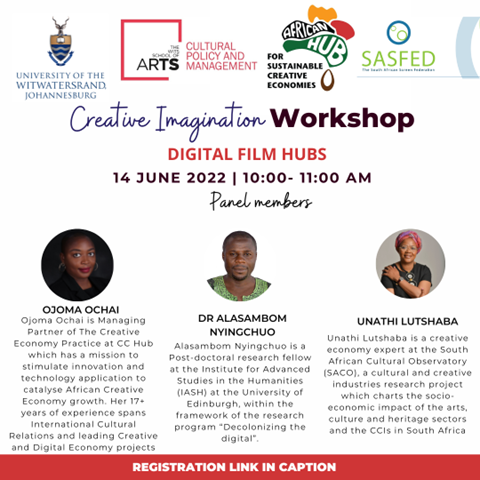Written by Vuyo Madyibi (SA Hub Creative Partnerships Coordinator).

The SA Hub, facilitated by Avril Joffe of the University of the Witwatersrand, hosted the first of a series of collaboration workshops on Developing Digital Film Hubs on June 14, 2022. With digital production technology, digital distribution, and digital skills under threat, digital hubs have been identified as an essential initiative for developing these capabilities
As part of our panellist discussion, we discussed relevant infrastructure to support digital filmmaking and advances in digital technology. The panel included Unathi Lutshaba (SACO Executive Director), Dr Alasambom Nyingchuo (Lecture, University of Bamenda, Cameroon), Skhumbuzo Mvelase (NFVF), Aya Dlova (Manager Cortex Hub), Sthembiso Mphehle (Filmmaker, Tshimologong Precinct).
Dr Nyingchuo spoke about the challenges facing the film sector due to Covid and the advent of 24-hour television, which is negatively affecting cinema halls in Cameroon. This poses challenges for filmmakers to showcase their films as cinema halls are no longer functioning and DVDs are outdated. Furthermore, their policies make it difficult to distribute films compared to the West, where there are many online streaming platforms. African countries could benefit from online platforms as this could improve film production and maximise the economy.
Skhumbuzo Mvelase spoke about local development and how it is good for the economy of developing provinces when filmmakers come from different provinces. He explained that artists who come to shoot should not leave immediately after shooting but stay locally and perhaps spend money to strengthen that economy.
The idea of creating an area for graduates who are qualified to create work was discussed by Aya Dlova. The lack of employment opportunities for graduates in the Eastern cape led to the creation of the Cortex Hub, whose purpose is to empower the next generation of future job creators with a space where they can get mentorship and resources to aid their entrepreneurial journeys. Part of this is creating spaces for both parties to interact, where creatives can interact with those CCIs that can hire them. The film hub has an auditorium, sound studio and editing facilities, all of which are available to filmmakers based in East London.
The Tshimologong Digital precinct’s Sthembiso Mphehle presented some of the programmes it offers, including The Digital Skills Academy, Digital Lab Africa, and Animation Academy. You can read up about these programmes on the Tshimologong website at https://tshimologong.joburg/.
Unathi Lutshaba, a creative economy expert at the South African Cultural Observatory, presented the findings of some of their reports. The film industry contributes almost 3% to the country’s GDP, which is a little under agriculture. Audio-visual and interactive media specifically contributed 30% according to the latest mapping study report. To read about the digital content report, click here.
One participant highlighted the importance of focusing on film as a long-form, as opposed to short forms and other material that is seen, like user-generated content. Another participant asked if festivals were still important for growing audiences as she is trying to set up a South African association of film festivals. Several participants expressed great interest in the idea of forming an association for film festivals.
A special thanks to our guest speakers; Dr Nyingchuo, Mr Mvelase, Mr Dlova, Mr Mphehle and Ms Lutshaba. Thank you to our international partners, Dr Roberta Comunian and Dr Lauren England at Kings College London and Dr Brian Hracs from Southampton University. Thanks to the leads from the two other African Hubs based at the University of Nairobi and Lagos University. Lastly, we thank our local partner, the South African Screen Federation; and our local collaborators, the South African Cultural Observatory, and the Tshimologong Digital Precinct.
The full workshop programme can be downloaded here below.
